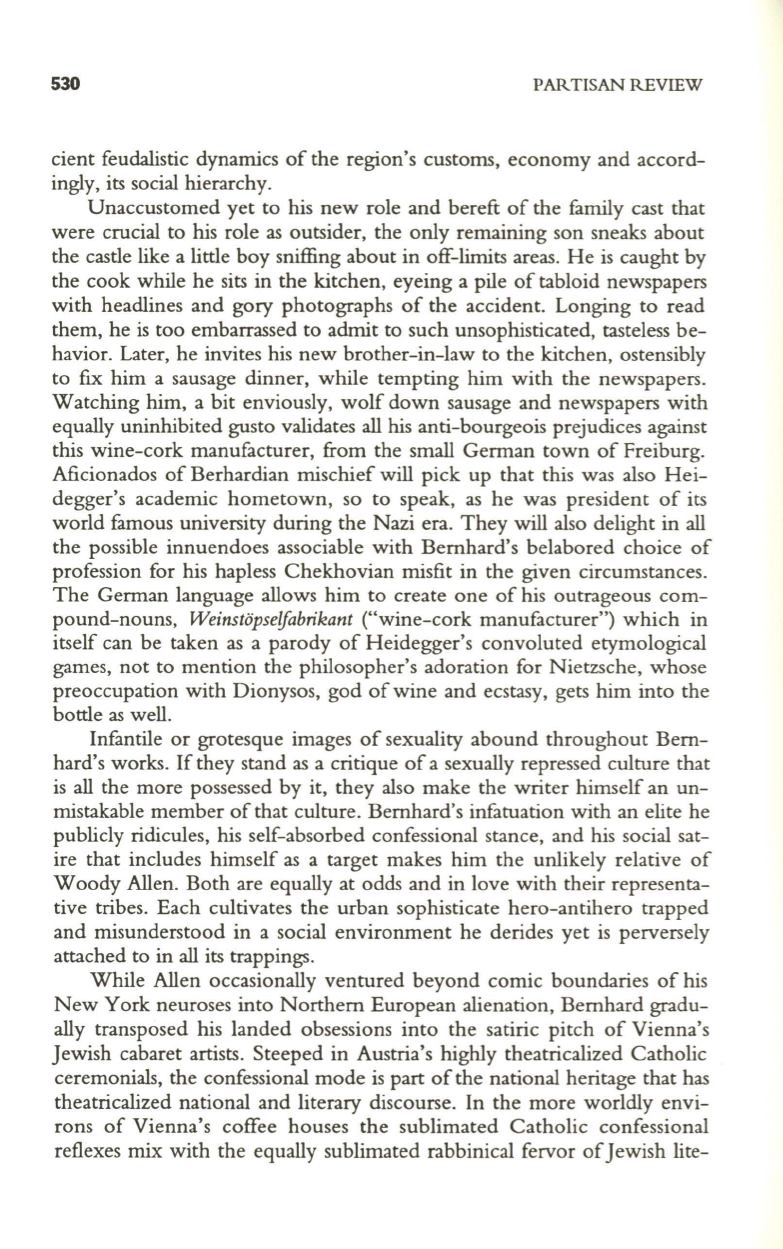
530
PARTISAN REVIEW
cient feudalistic dynamics of the region's customs, economy and accord–
ingly, its social hierarchy.
Unaccustomed yet to his new role and bereft of the family cast that
were crucial to his role as outsider, the only remaining son sneaks about
the castle like a little boy sniffing about in off-limits areas. He is caught by
the cook while he sits in the kitchen, eyeing a pile of tabloid newspapers
with headlines and gory photographs of the accident. Longing to read
them, he is too embarrassed to admit to such unsophisticated, tasteless be–
havior. Later, he invites his new brother-in-law to the kitchen, ostensibly
to
fix
him a sausage dinner, while tempting him with the newspapers.
Watching him, a bit enviously, wolf down sausage and newspapers with
equally uninhibited gusto validates all his anti-bourgeois prejudices against
this wine-cork manufacturer, from the small German town of Freiburg.
Aficionados of Berhardian mischief will pick up that this was also Hei–
degger's academic hometown, so to speak, as he was president of its
world famous university during the Nazi era. They will also delight in all
the possible innuendoes associable with Bernhard's belabored choice of
profession for his hapless Chekhovian misfit in the given circumstances.
The German language allows him to create one of his outrageous com–
pound-nouns,
Weinstopselfabrikant
("wine-cork manufacturer") which in
itself can be taken as a parody of Heidegger's convoluted etymological
games, not to mention the philosopher's adoration for Nietzsche, whose
preoccupation with Dionysos, god of wine and ecstasy, gets him into the
bottle as well.
Infantile or grotesque images of sexuality abound throughout Bern–
hard's works. If they stand as a critique of a sexually repressed culture that
is all the more possessed by it, they also make the writer himself an un–
mistakable member of that culture. Bernhard's infatuation with an elite he
publicly ridicules, his self-absorbed confessional stance, and his social sat–
ire that includes himself as a target makes him the unlikely relative of
Woody Allen. Both are equally at odds and in love with their representa–
tive tribes. Each cultivates the urban sophisticate hero-antihero trapped
and misunderstood in a social environment he derides yet is perversely
attached to
in
all its trappings.
While Allen occasionally ventured beyond comic boundaries of his
New York neuroses into Northern European alienation, Bernhard gradu–
ally transposed his landed obsessions into the satiric pitch of Vienna's
Jewish cabaret artists. Steeped in Austria's highly theatricalized Catholic
ceremonials, the confessional mode is part of the national heritage that has
theatricalized national and literary discourse. In the more worldly envi–
rons of Vienna's coffee houses the sublimated Catholic confessional
reflexes
mix
with the equally sublimated rabbinical fervor ofJewish lite-


